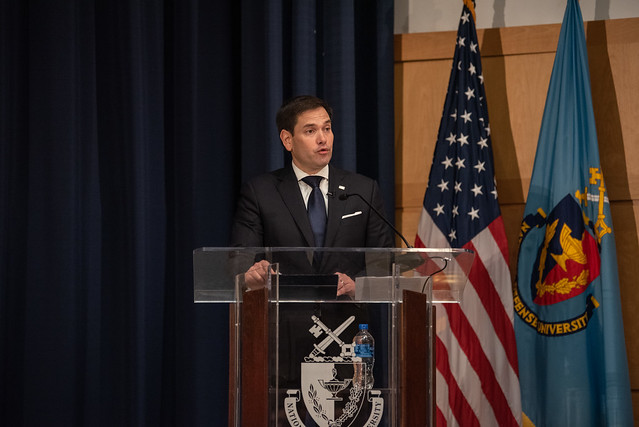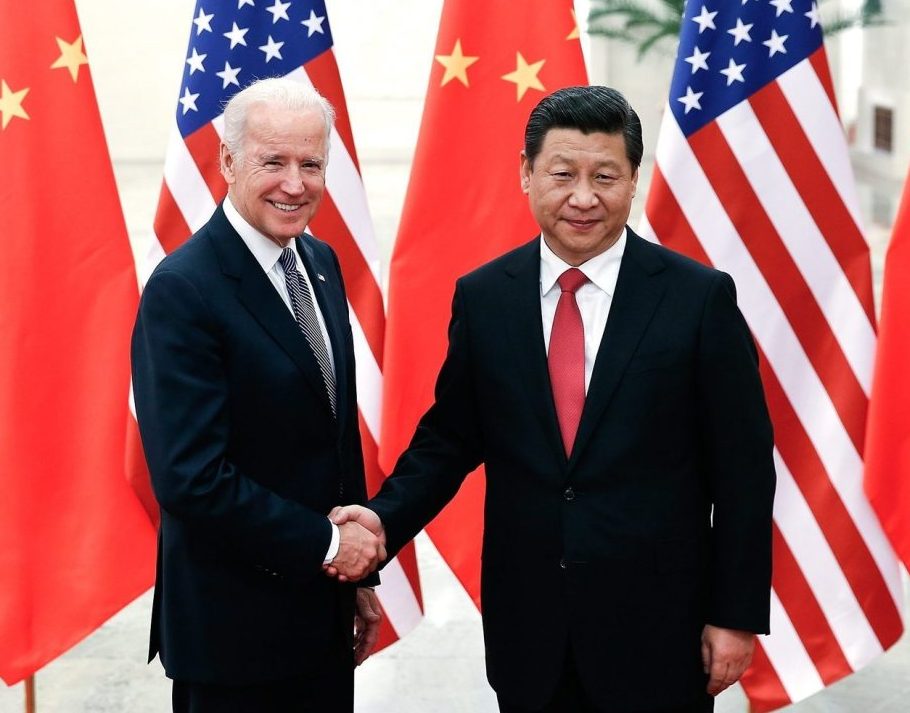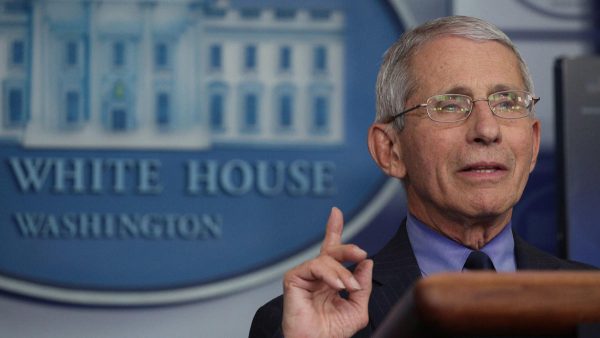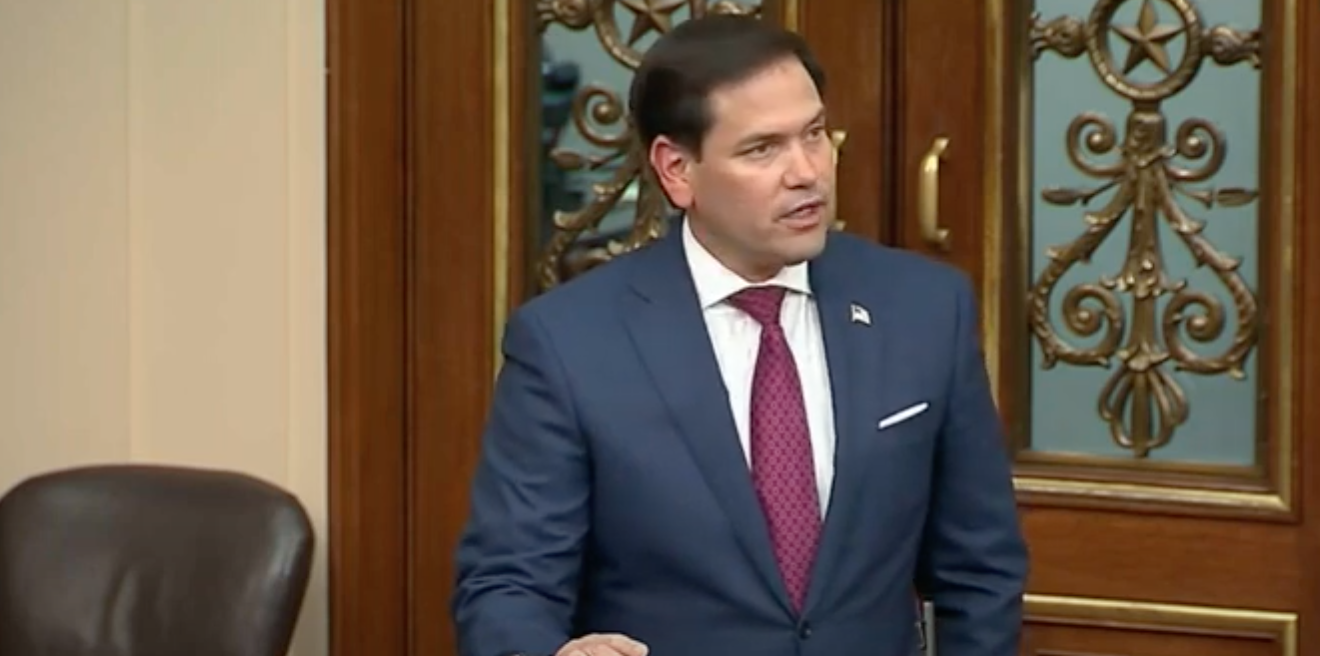To fight prejudice, get the bureaucrats out of power.
Exclusive: American Industrial Policy and the Rise of China

Senator Marco Rubio speaks at National Defense University on the need for a ‘pro-American industrial policy’ to counter China.
The following speech was delivered by Florida Senator Marco Rubio at the National Defense University on December 10, 2019. In an exclusive to The American Mind, it is here reproduced in full as prepared for delivery.
Last month, I spoke to students at Catholic University about the growing sense that our nation’s institutions, especially in government, are unable to identify a common good and pursue it. I outlined my view of how that poses a threat to our economic foundation and our ability to respond to threats abroad.
I started the speech using a 19th-century papal encyclical as its launch point—a document written as industrialization was causing tremendous economic change and disruption, a time not unlike our own.
This morning I am honored to speak here at the National Defense University to discuss the defining geopolitical relationship of this century: the one between the United States and China.
Unfortunately, I was unable to find a papal encyclical on this topic.
But this is the perfect setting for this message, given the mission of NDU to prepare its graduates with the ability to develop strategies to solve our nation’s most difficult national security challenges.
Changes in Domestic Attitudes on China
For decades, we enjoyed a broad consensus that, once China became rich, they would become more like us—more democratic and respectful of the rules that govern international trade and commerce.
But while China has become richer, it has only deepened its authoritarian grip domestically, while flagrantly defying international law and commerce.
The last several years have brought a long overdue and almost too-late readjustment to our views on China.
Almost overnight, we have awakened to the reality that “while America slept,” the Chinese Communist Party has emerged as an immediate and growing threat to prosperity, our freedoms, and our security.
Multinational corporations headquartered in our country, in search of quick profits, have outsourced the dignified jobs that once sustained Americans to China. And our policymakers rewarded this behavior.
Now, once vibrant cities and towns are shells of their former selves, where incomes once supported by a valuable industry get replaced by government checks and credit card debt.
Tons of fentanyl manufactured in China flood our country, take thousands of lives, and destroy countless families.
Experts were intoxicated with post-Cold War fantasies about “the end of history.” A bipartisan consensus formed that an American-helmed international system would forever be the new normal, and the arc of all nations was toward democracy and respect for the rule of law.
We have made great progress toward advancing our values and interests. But it is now clear that our consensus on China was dangerously flawed.
Explaining the Rise of China
China believes that its rightful place is at the center of the world and views the last 100 years as an aberration it intends to correct.
They have no interest in adhering to the rules of a post-war international system we helped create, instead seeking to upend or replace it.
They pursued these plans while “hiding their strength and biding their time,” portraying themselves as a poor developing country and a non-expansionist power.
And they succeeded in luring American policymakers into making negligent and catastrophic mistakes.
Washington passed financial, trade, tax, and patent laws designed to smooth over the process for companies to open up operations in China. In turn, China would force those American companies to partner with domestic competitors, which would steal their trade secrets and then put them out of business.
Washington allowed China into what was supposed to be the trade union of free states, the World Trade Organization. Beijing accepted all the benefits but none of the responsibilities that came with that membership.
And under intense lobbying from companies desperate for access to the enormous Chinese market, Washington did little to call out or address the Chinese Communist Party’s human rights abuses in Tibet, in Xinjiang, and three decades ago in Tiananmen Square.
Meanwhile, Chinese leaders kept subsidizing their domestic industries while undermining ours.
China kept stealing intellectual property and reverse-engineering products.
China kept expanding access to our markets for their companies, while restricting access to their markets for ours.
And China used the profits from these unfair practices to fund substantial investments in research and development of their own.
And now we awaken to the reality that for the first time in three decades, we are confronted with a near-peer rival that seeks to displace us militarily, economically, technologically, and geopolitically.
Our aim should not be to halt China’s rise.
The task before us is to prevent America’s fall.
China is and will continue to be a great global power, but we must not continue to allow its progress to come at the expense of our country, our citizens, our values, and the rules-based international order that emerged from the incredible sacrifices made by the generations before us—who defeated Nazi Germany in World War II and the Soviet Union in the Cold War.
This century will be defined by the relationship between the United States and China.
And it will either be the story of an unfair and unbalanced relationship that led to the decline of a once great beacon of liberty and prosperity.
Or it will be the story of a stable, balanced, and sustainable relationship that allowed us to further and protect our national interest and the common good of our people.
What Is a Balanced Relationship With China?
What is that kind of balanced and sustainable relationship?
It’s to no longer ignore China’s repeated and flagrant violations of the international rule of law.
Violations of the assurances they made to the people of Hong Kong when their city was handed over.
Violations like the construction and militarization of artificial islands in the South China Sea, after years of promising the whole world that they would never do so.
It’s to no longer ignore China’s repeated and flagrant violations of human rights.
Forcing over one million Uyghur and other Muslims into labor camps in Xinjiang.
The systematic oppression of all religions: Islam, Buddhism, Christianity, Judaism, and Falun Gong alike.
And the crackdown on political dissent at home and freedom of expression everywhere, including here in the United States.
It is rejecting Chinese colonial expansionism, which ensnares smaller countries in a state of permanent economic vassalage.
The exploitation of political corruption to lay debt traps, bleeding countries dry and then hijacking their domestic and economic infrastructure.
And the use of state-associated firms like Huawei to entice foreign nations into exploitative contracts that give China access to foreign nations’ critical national security data.
The Centrality of Economic Power
But the most important element of a balanced relationship with China is to address how China has used its material resources, like access to its vast consumer markets, massive labor force, and technological development of its companies, to further its national interest and undermine ours.
It is a fact that when you’re doing business with a Chinese company, you’re doing business with the Chinese Communist Party.
Beijing has used the foreign investment of American companies to steal intellectual property and technologies in order to build their own native capacities and destroy ours.
A few years ago they publicly outlined their plan to dominate ten emerging industries in the 21st century.
This isn’t just some tin-pot communist “Five Year Plan.” It is a coherent strategy to become the world leader in industries such as aerospace, quantum computing, and industrial machinery.
Let me read to you a quote, one translation of the plan’s introduction:
Manufacturing is the main pillar of the national economy, the foundation of the country, tool of transformation and basis of prosperity. Since the beginning of industrial civilization in the middle of the 18th century, it has been proven repeatedly by the rise and fall of world powers that without strong manufacturing, there is no national prosperity.
This is a serious and direct challenge our nation must respond to for two reasons.
First, because one of the most powerful defenses of our American system has long been the prosperity of our way of life.
For generations, industrial jobs have made up the core of our middle class, enabling Americans to make a good living and give their time and treasure back to their families and communities. These are the families where stable, dignified work allowed kids to “do better” than their parents, opening up a world of opportunities in education, work, and life.
In many of our communities, local factories and other industrial centers provided the “good,” productive jobs—a source of pride to their communities and envy to much of the world.
China and its authoritarian communism have aimed to sabotage that defense.
So while it may be true that China is “breaking the rules” or that Chinese companies are engaging in “unfair competition” against the American order, the fundamental challenge will not simply be solved by some future trade agreement.
The fundamental challenge is that China seeks to prove that you can have a prosperous society, a contented citizenry, and be the world’s major power without respecting human dignity, freedom, or God.
And the second reason we must respond to the challenge before us is because the industries that China intends to dominate are the very ones that will create the dignified and productive work Americans need for us to remain a strong nation.
The Perils of Free-Market Fundamentalism
Responding to this challenge will require us to reject the fundamentalism that argues that the greatest virtue in American policy is to maximize “efficiency.”
The market will always reach the most efficient economic outcome, but sometimes the most efficient outcome is at odds with the common good and the national interest.
Outsourcing jobs to China may be more efficient because it lowers labor costs and increases profits.
But the good jobs we lose end up destroying families and communities.
Just last year, a study found that areas of the United States that faced Chinese import saturation from 1990 to 2014 experienced drops in male employment, as well as declining marriage and fertility rates.
In communities that bore the brunt of “normalizing” trade relations with China—to put it euphemistically—we even see jumps in suicide rates and deaths from substance abuse.
For public policy makers, the common good can’t just be about corporate profits. When dignified work, particularly for men, goes away, so goes the backbone of our culture. Our communities become blighted and wither away. Families collapse, and fewer people get married. Our nation’s soul ruptures.
This experience has become essentialized today in images of decaying Rust Belt towns and the epidemic of working-class “deaths of despair.” But this story is playing out just as destructively in our nation’s inner cities—from Flint to Phoenix and Baltimore to Birmingham. The erosion of dignified work is colorblind and geographically limitless.
Free enterprise is the greatest mechanism for achieving prosperity.
However, the market is agnostic as to whether America is a high- or low-wage economy.
The market is agnostic on whether a certain outcome is in our national interest or the common good.
But as a policymaker I am not.
And I suspect that all of you—men and women committed to our national security—are not ambivalent either.
The market may say short-term profits justify adhering to the requirements China places on our companies.
But policymakers must take into account that long-term surrendering our productive capacity to China is reckless.
The market may say Americans—often unwittingly—should invest in Chinese firms.
But policymakers must take into account whether American investors should be capitalizing the very firms that steal from our companies, commit human rights violations, and develop the weapons that could one day kill the men and women of our military.
This isn’t a call to socialism or a rejection of capitalism; it’s a call to policymakers to remember that the national interest, not economic growth, is our central obligation.
This isn’t a call to recreate the economy of America’s past. It’s a call to invest and compete in the emerging industries of the future, rather than forfeit them to China.
And this isn’t a call to knee-jerk protectionism. It’s a call to maintain the technological and industrial superiority necessary to defend our interests and ensure that working Americans have access to dignified and productive work.
Revitalizing American Industrial Policy
The critics of this approach argue that I am asking us to choose industries to favor and pick winners and losers.
But the truth is we are already doing that. The only difference is the path we are on now is allowing Beijing to do the picking and the choosing.
How secure or prosperous can America be if we cannot carry out heavy industry, pharmaceutical manufacturing, and advanced technology?
American policymakers must pursue policies that make our economy more productive by identifying the critical value of specific industrial sectors and spurring investment in them.
The depletion of America’s manufacturing sector has left us with a tremendous national security vulnerability.
I am not advocating for a government takeover of our means of production.
What I am calling for us to do is remember that from World War II to the Space Race and beyond, a capitalist America has always relied on public-private collaboration to further our national security.
And from the internet to GPS, many of the innovations that have made America a technological superpower originated from national defense-oriented, public-private partnerships.
This kind of collaboration is not a rejection of capitalism. It is a call to encourage and harness the dynamism of our economy’s most productive private industries to further our national security and ultimately our national economic development.
It is a call for a 21st-century pro-American industrial policy.
When it comes to Chinese firms, our companies aren’t competing with private enterprises; they are competing with a large and powerful nation-state.
And in the long run it is a competition that market fundamentalists won’t win.
Because China has learned how to leverage access to short-term profits as a way to get many American companies to commit long-term corporate suicide.
And because China provides their domestic companies the ability to make investments that make no market sense in the short term but are critical to their national and economic security in the long term.
The market fundamentalists argue that government should not be picking which industries to support—that instead we should unleash the market to make those decisions.
But what happens when an industry is critical to our national interest, yet the market determines it is more efficient for China to dominate it?
The best example of this is rare-earth minerals, which are vital to our defense and technology industry.
America currently imports 80 percent of rare-earths from China because the market has determined that importing them is more efficient than investing in our own domestic mining capacity.
What is in our national interest? To adhere to the market’s determination and be vulnerable to China crippling our industries and defenses? Or deciding that in this case the threat to our security makes clear the market is not promoting the common good and, therefore, providing government support for increasing our domestic capacity to mine rare-earth minerals?
But the decision to observe when the market advances the common good shouldn’t just be limited to those instances in which its determination runs contrary to our national defense.
The most controversial argument I have made is that the loss of productive, dignified jobs for Americans represents an existential threat to the common good—especially ones that are not easily replaced.
Is it not in our national interest to have productive and dignified jobs available for young people entering our workforce? For parents who need to support the next generation of Americans? For veterans returning to civilian life after serving our country?
Is it not in our national interest to ensure that productive new jobs are not only available to Wall Street and Silicon Valley but to working Americans across all of our nation?
This is what motivates me as chairman of the Small Business Committee to overhaul our Small Business Administration.
Not because I believe a revitalized SBA alone is the key to creating these kinds of jobs. But because I believe our federal policies should be directed toward encouraging physical investment and new, dignified work opportunities here in America.
I want to ramp up the amount of federal funding for R&D available to small businesses.
I want to modernize existing SBA programs so they prioritize encouraging investment in high-potential firms in strategically important industries such as aerospace, rail, electronics, telecommunications, and agricultural machinery.
In essence, in the same industries China is trying to dominate via their Made in China 2025 initiative.
This is just a small part of the much broader modernization of our economic policies that we need.
Furthermore, we should expand and make permanent the immediate write-off for any business investment in machinery, structures, and land, as well as remove bias in our tax code that incentivizes businesses to buy back shares, instead of reinvesting profits into their firms and workers.
We should continue President Trump’s regulatory rollback to achieve a better balance between our nation’s economic vitality and commonsense protections.
Doing so will provide a viable alternative for American companies considering joint ventures with Chinese firms in order to gain access to capital.
It will help revitalize American manufacturing, which in turn will bring higher wages and stable work opportunities that allow for renewed family and community engagement. We will reestablish a capitalism of the common good.
In an essay last month, NDU professor Walter Hudson invoked the words of President Eisenhower—an alumnus and the namesake, of course, of your school: “Spiritual force multiplied by economic force multiplied by military force is roughly equivalent to security. If any one of those factors fell to zero, or nearly so, the resulting product does likewise.”
For the United States to be strong in all of these areas, and provide for our long-term national prosperity, and for a strong national defense, and for the dignified work that allows families and communities to thrive and share a sense of purpose—we need to restore our commitment to that kind of common-good capitalism.
Conclusion
Our current economic policy debate offers us an archaic and false choice.
The left wants more government programs and more taxes on everything and everyone to pay for them—often advocating incentives and punishments on private industry that stoke identity politics and culture wars, but ignore and even undermine our national security and job creation.
The market fundamentalists on the right want more record-setting days in the stock market above all else—even if it means our dependence on and losses to China continue expanding to American industries higher up the value chain.
It is this financialization of economic policymaking that first allowed China to take over the production of toys, cabinets, and mass consumer electronics—and then take over the production of generic pharmaceuticals. And now, they move to take over our genomic therapy industry.
To what end?
Until it doesn’t matter what innovation we come up with, because China will steal it and make it cheaper?
Until it doesn’t matter how much we spend on research and development, because we need China to manufacture the end result for us?
Until every leading technology, communication, transportation, and aerospace leader in the world is a Chinese state-backed firm?
If that day should ever come, then we will live in a world in which the most powerful nation on Earth will not be one that believes all people are created equal and born with a God-given right to life, liberty, and the pursuit of happiness.
The most powerful nation on Earth will be a dictatorship that believes man exists to serve the state; that its citizens’ opinions and religion must be cleared by political leaders first; and that the only rights you have are those that the government allows us to have.
What kind of world would that be? What would it mean for Americans here at home?
We can already see a preview of it in our current events.
How dozens of Muslim nations defend China’s treatment of Uyghur Muslims for fear of losing access to the Chinese market or investment.
How Hollywood self-censors movies and television shows for fear of not being able to make money in China.
How the most downloaded social media app in the United States, owned by a Chinese firm, banned a young American from the platform because she posted a video drawing attention to the mass atrocities in Xinjiang.
How under pressure from China, an hourly employee of Marriott in Omaha, Nebraska was fired for liking a Twitter post from a Tibetan separatist group.
How nations throughout the world, despite knowing the espionage risk posed by Chinese telecommunications companies, have allowed them to take over their domestic deployment of 5G, because no non-Chinese, cost-effective competitor exists.
And how these same companies are so deeply embedded in our own domestic networks that we still aren’t able to remove their equipment from our own military bases.
This is but a small preview of the future that awaits us if do not undertake a complete reorientation of our economic policies.
It is not enough to ban Chinese technology or condemn Chinese human rights abuses.
Achieving a peaceful, sustainable balance between the United States and China will require us to increase our national strength.
By rejuvenating our nation’s economic power.
By prioritizing and incentivizing private economic activities that give Americans opportunities for dignified work.
And by furthering our national development through 21st-century American industrial policy compatible with and complementary to our free market system.
The stakes could not be higher.
Because the outcome will define the 21st century.
The American Mind presents a range of perspectives. Views are writers’ own and do not necessarily represent those of The Claremont Institute.
The American Mind is a publication of the Claremont Institute, a non-profit 501(c)(3) organization, dedicated to restoring the principles of the American Founding to their rightful, preeminent authority in our national life. Interested in supporting our work? Gifts to the Claremont Institute are tax-deductible.
American voters will decide if the PRC wins.
Bostock demands a complete change of course from neutered judicial “conservatism.”
COVID-19 revealed what fools we have made of ourselves.






